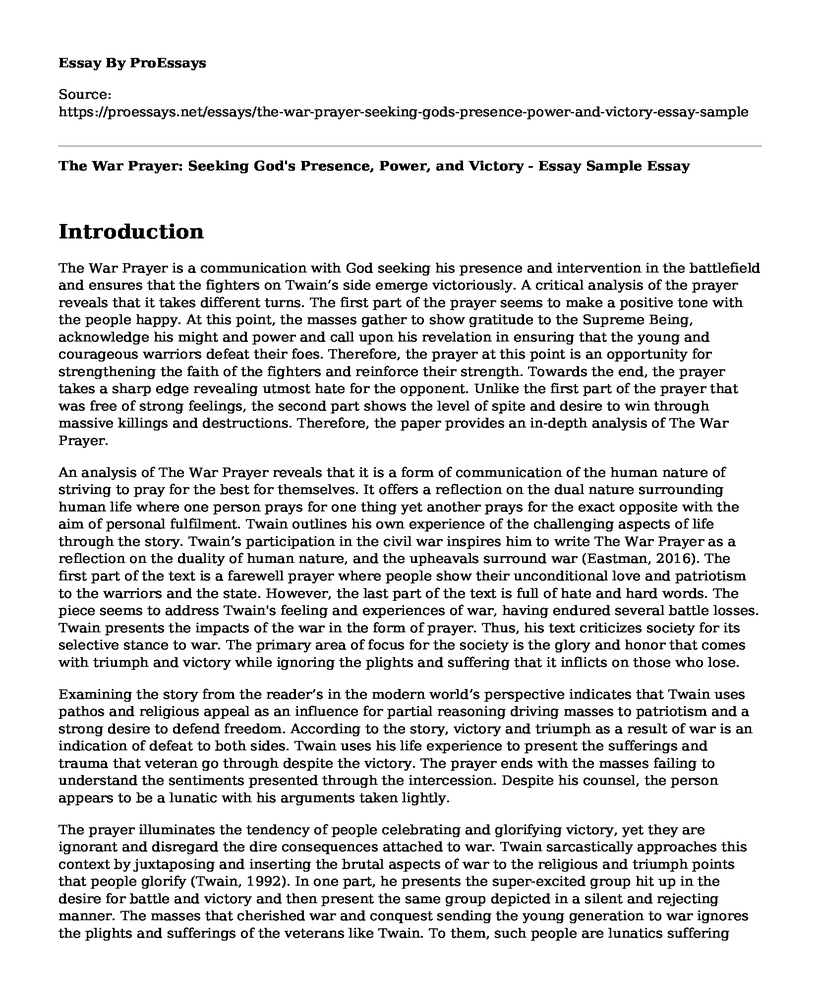Introduction
The War Prayer is a communication with God seeking his presence and intervention in the battlefield and ensures that the fighters on Twain’s side emerge victoriously. A critical analysis of the prayer reveals that it takes different turns. The first part of the prayer seems to make a positive tone with the people happy. At this point, the masses gather to show gratitude to the Supreme Being, acknowledge his might and power and call upon his revelation in ensuring that the young and courageous warriors defeat their foes. Therefore, the prayer at this point is an opportunity for strengthening the faith of the fighters and reinforce their strength. Towards the end, the prayer takes a sharp edge revealing utmost hate for the opponent. Unlike the first part of the prayer that was free of strong feelings, the second part shows the level of spite and desire to win through massive killings and destructions. Therefore, the paper provides an in-depth analysis of The War Prayer.
An analysis of The War Prayer reveals that it is a form of communication of the human nature of striving to pray for the best for themselves. It offers a reflection on the dual nature surrounding human life where one person prays for one thing yet another prays for the exact opposite with the aim of personal fulfilment. Twain outlines his own experience of the challenging aspects of life through the story. Twain’s participation in the civil war inspires him to write The War Prayer as a reflection on the duality of human nature, and the upheavals surround war (Eastman, 2016). The first part of the text is a farewell prayer where people show their unconditional love and patriotism to the warriors and the state. However, the last part of the text is full of hate and hard words. The piece seems to address Twain's feeling and experiences of war, having endured several battle losses. Twain presents the impacts of the war in the form of prayer. Thus, his text criticizes society for its selective stance to war. The primary area of focus for the society is the glory and honor that comes with triumph and victory while ignoring the plights and suffering that it inflicts on those who lose.
Examining the story from the reader’s in the modern world’s perspective indicates that Twain uses pathos and religious appeal as an influence for partial reasoning driving masses to patriotism and a strong desire to defend freedom. According to the story, victory and triumph as a result of war is an indication of defeat to both sides. Twain uses his life experience to present the sufferings and trauma that veteran go through despite the victory. The prayer ends with the masses failing to understand the sentiments presented through the intercession. Despite his counsel, the person appears to be a lunatic with his arguments taken lightly.
The prayer illuminates the tendency of people celebrating and glorifying victory, yet they are ignorant and disregard the dire consequences attached to war. Twain sarcastically approaches this context by juxtaposing and inserting the brutal aspects of war to the religious and triumph points that people glorify (Twain, 1992). In one part, he presents the super-excited group hit up in the desire for battle and victory and then present the same group depicted in a silent and rejecting manner. The masses that cherished war and conquest sending the young generation to war ignores the plights and sufferings of the veterans like Twain. To them, such people are lunatics suffering from numerous chains of personal misfortunes.
The implications of the narrator as a lunatic at the end of the story reflects on the failures of society to follow the realities of life but instead focus on criticizing those who expressed issues the way they are. Twain suffered psychologically as a result of critics and rejections as he evaluated issues in an angle that appears crude to the general opinion. Therefore, he uses the second part of The War Prayer as a call for sociological cautiousness to the real imperialist nature of America’s history (Zehr, 2009). Twain categorically states that war causes death and destructions to humble citizens. Therefore, he seeks to awaken people to the evils of war while at the same time examining the stance of religion on the issue. In this context, Twain seems to provoke the ambiguous and double-standard practices within the church, driving it towards ignoring its utmost role of instilling consciousness and providing the right directions for a nation. Finally, The War Prayer adheres to Twain’s approach to real issues affecting peoples’ lives by use of sarcasm and irony. He crashes the celebrations in church with the eminent destructions to property and loss of life, thereby providing contradicting emotions.
References
Eastman, S. L. (2016). Mark Twain's “The War Prayer” in Film and Social Media. The Mark Twain Annual, 14(1), 78-92.
Twain, M. (1992). Mark Twain's weapons of satire: Anti-imperialist Writings on the Philippine-American war. Syracuse University Press.
Zehr, M. (2009). The Vision of the Other in Mark Twain's' War-Prayer'. Journal of Transnational American Studies, 1(1).
Cite this page
The War Prayer: Seeking God's Presence, Power, and Victory - Essay Sample. (2023, Aug 13). Retrieved from https://proessays.net/essays/the-war-prayer-seeking-gods-presence-power-and-victory-essay-sample
If you are the original author of this essay and no longer wish to have it published on the ProEssays website, please click below to request its removal:
- Religion Essay Sample: Apostle Paul's Message to the Church in His Epistles
- Essay on Art Politics and Religion
- God, Humanity, and the Universe: A Christian Perspective Essay
- Essay Sample on The Teachings of Matthew 5: 21 - 48
- Essay Sample on Christian Ministry: Empowering Youth Through Sports and Fellowship
- Essay Sample on Constantine's Contributions to Christianity and Its Impact Today
- Essay Sample on Modernizing Islamic Tradition: Cultural Transformation and Ideological Reinvention







